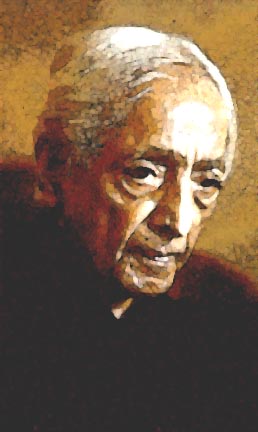 Jiddu
Krishnamurti was a lifelong teacher and
philosopher who traveled throughout the world
sharing his message of personal liberation. His
teachings recognized the conditioning of mankind
and his efforts were to liberate man from that
cage of conditioning. Jiddu
Krishnamurti was a lifelong teacher and
philosopher who traveled throughout the world
sharing his message of personal liberation. His
teachings recognized the conditioning of mankind
and his efforts were to liberate man from that
cage of conditioning.
Born
in 1895, Krishnamurti was the eighth child of a
Brahmin family. As Evelyne Blau states in her
book Krishnamurti: 100
Years: "The cow-herd
god Sri Krishna was himself an eighth child, and
honoring that Hindu tradition the baby was named
Krishnamurti." Krishnamurti was discovered
by the Theosophical Society in 1909. The
Theosophical Society was started in New York in
1875 by Helena Blavatsky and Colonel Henry
Olcott. It was a combination of many mystical
beliefs, including gnosticism and eastern
mystcism. It was seen as a religion combining the
best of all beliefs. In 1909, then president of
the Theosophical Society Annie Besant proposed
the idea that a "World Teacher" should
be born to unify the religions of the world and
guide Earth to its next phase of development.
Although, she acknowledged a sense of
reincarnation for this character as Buddhism
played a part in the formation of Theosophical
thought (and also the Indian Theosophists, who
believed he might be the reincarnation of the
bodhisattva Maitreya), it is a stretch to refer
to him as their "resurrected messiah",
as the Society was only a few decades old. The
society itself referred to Krishnamurti as
"The World Teacher", and not as
resurrected messiah.
Krishnamurti
was adopted by the Theosophical Society and
educated in Europe. An organization within the
Theosophical Society called "The Order of
the Star of the East" was formed to
facilitate the coming of Krishnamurti. In 1929,
Krishnamurti shocked his followers by dissolving
the Order of the Star, declining the title of
World Teacher, and declaring that all
organizations and dogmas were obstacles to truth.
"As I said," noted Krishnamurti,
"you have been preparing for eighteen years
for me. I do not care if you believe that I am
the World–Teacher or not. That is of very
little importance."
|